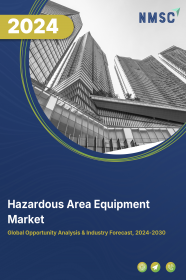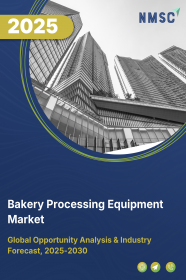
Hazardous Area Equipment Market by Product (Cable Glands & Accessories, Measurement Devices, Control Products, Alarm Systems, Motors, Lighting Products, and Others), Service (Wired and Wireless), and End User (Oil & Gas, Mining, Chemical & Pharmaceutical, Automotive, Aerospace, and Others) – Global Opportunity Analysis and Industry Forecast 2024-2030
Market Definition
The global Hazardous Area Equipment Market size was valued at USD 10.0 billion in 2023 and is predicted to reach USD 14.7 billion by 2030 with a CAGR of 5.7% from 2024-2030. Hazardous area equipment is specialized equipment and devices designed to operate safely in potentially hazardous or explosive atmospheres.
Industries such as oil & gas, chemical processing, pharmaceuticals, and mining involve processes that generate flammable gases, vapors, dust, or other combustible substances. In such an environment, the risk of ignition and explosion is a significant concern.
This equipment is designed to prevent the ignition of flammable substances by incorporating features such as explosion-proof enclosures, increased safety measures, and protection against dust or gas ingress. Hazardous area equipment is specifically engineered to mitigate risks associated with these environments, ensuring the safety of personnel, equipment, and facilities.
Market Dynamics and Trends
The hazardous area equipment market is driven by numerous factors such as a rise in mineral extracting operations, gas & crude oil drilling, and other mining operations. These activities frequently occur in demanding and dangerous environments, characterized by the risk of explosions and release of harmful gases, thereby increasing demand for hazardous area equipment to ensure safety in such conditions.
In addition, a rise in awareness of workplace safety, coupled with active involvement from government bodies in setting guidelines and enforcing stringent safety regulations, further contributes to the expansion of the hazardous area equipment market.
For instance, in September 2023, the government of China issued guidelines aimed at tightly regulating the safety of coal mine workers and other valuable assets. This increase in focus on safety concerns to safeguard workers and resources highlights the rise in the need for safety equipment in hazardous working places, thereby propelling the growth of the market.
However, limited awareness about the importance of hazardous area equipment and safety standards, particularly in certain industries or regions, acts as a significant constraint to the market's growth.
On the other hand, integration of the Internet of Things (IoT) in hazardous area equipment allows better data collection and remote monitoring. The devices and sensors can provide real-time information and enable quicker responses in hazardous environments.
These advancements in equipment are expected to create future opportunities for market growth. For instance, in September 2023, Nokia launched a series of industrial 5G devices designed for challenging environments such as ports, mines, and chemical plants.
The ruggedized 5G handhelds include a US-manufactured device for public safety teams, featuring durability, dual-SIM functionality, and customizable keys for push-to-talk communication. Nokia is also expanding its 5G handheld portfolio with explosion-proof phones through a partnership with i.safe MOBILE GmbH, catering to sectors such as oil & gas, mining, and chemical manufacturing for enhanced safety, productivity, and efficiency.
Market Segmentations and Scope of the Study
The hazardous area equipment market is segmented based on product, service type, end-user, and region. Based on product type, the market is divided into cable glands & accessories, measurement devices, control products, alarm systems, motors, lighting products, and others.
Based on service type, it is divided into wired and wireless. By end-user, it is categorized into bifurcate oil & gas, mining, chemical & pharmaceutical, automotive, aerospace, and others. Region-wise, the market is analyzed across North America, Europe, Asia-Pacific, and RoW.
Geographical Analysis
North America holds a dominant share of the hazardous area equipment market and is expected to continue its dominance during the forecast period. The increase in industrial activities in this region is leading to a higher risk of workplace accidents, such as explosions, structural failures, and internal floods. This rising risk underscores the growing importance of equipment designed for hazardous areas, contributing to the expansion of the market.
According to a recent report from the United States Nuclear Regulatory Commission, there are currently 94 licensed nuclear power plants in the U.S. These nuclear plants have areas with a potentially explosive atmosphere, posing a risk of fire and explosion. The presence of such hazardous areas in these plants propels the demand for safety equipment for the safety of both plants and workers, which in turn, propels the market growth.
Furthermore, the growth of the hazardous area equipment market is propelled by the presence of major industries such as Rockwell Automation, Inc., Emerson Electric Co., and Honeywell International Inc. in the region.
For instance, in August 2020, Rockwell Automation launched Allen?Bradley 1718 Ex I/O modules are designed for hazardous applications in industries such as chemicals, oil and gas, and food and beverage.
These distributed I/O modules offer Ethernet/IP connectivity to field devices in Zone 0 and Zone 1 hazardous areas, reducing wiring and saving space in industrial applications, offering efficient solutions for industrial producers in challenging environments.
On the other hand, Asia-Pacific is showing a steady rise in the hazardous area equipment market, owing to a rise in awareness among workers and governments, emphasizing importance of ensuring the safety of both workers and assets.
For instance, in January 2023, the Director General of Mines Safety (DGMS) took proactive steps to enhance safety in the mining industry in India, emphasizing safety with measures such as digital monitoring, simplified approvals, and increased worker involvement. The overarching aim is to reduce fatality rates and promote responsible mining practices, contributing to a safer and more sustainable work environment while supporting economic growth.
Moreover, the growth of the hazardous area equipment market is driven by the significant presence of mining industries in the Asia-Pacific countries such as China, Australia, and India. For instance, China accounts for 1500 major mining sectors, with 75% of them operating underground highlighting the necessity for adequate safety equipment. In underground mining, there are inherent risks such as confined spaces, gas emissions, and the potential for explosions.
To mitigate these risks and ensure the safety of workers and operations, there is a heightened demand for safety equipment. This surge in demand for safety equipment to ensure the safety of workers and assets propels the growth of the hazardous area equipment market.
Competitive Landscape
The hazardous area equipment market comprises various market players such as ABB Ltd, WERMA Signaltechnik GmbH + Co. KG, Siemens Aktiengesellschaft (AG), Eaton Corporation, Rockwell Automation, Inc., Honeywell International Inc., Emerson Electric Co., PATLITE Corporation, R. STAHL AG, and E2S Warning Signals. These market players are adopting various partnerships and acquisitions across various regions to maintain their dominance in the market.
For instance, in January 2023, Siemens introduced two innovative aspirating smoke detectors, namely FDA261 and FDA262. These detectors play a crucial role in safeguarding expansive areas, and hazardous workplaces from fire incidents.
Furthermore, in January 2023, Axis Communications unveiled the AXISP1468-XLE, the explosion-protected bullet camera crafted for Zone 2 hazardous locales. This camera not only boasts smoke and fire detection capabilities but also integrates a deep learning processing unit (DLPU), enabling advanced features.
Key Benefits
-
The report provides quantitative analysis and estimations of the hazardous area equipment market from 2024 to 2030, which assists in identifying the prevailing market opportunities.
-
The study comprises a deep-dive analysis of the hazardous area equipment market including the current and future trends to depict prevalent investment pockets in the market.
-
Information related to key drivers, restraints, and opportunities and their impact on the hazardous area equipment market is provided in the report.
-
A competitive analysis of the players, along with their market share is provided in the report.
-
SWOT analysis and Porter's Five Forces model are elaborated in the study.
-
Value chain analysis in the market study provides a clear picture of the roles of stakeholders.
Hazardous Area Equipment Market Key Segments
By Product
-
Cable Glands & Accessories
-
Measurement Devices
-
Control Products
-
Alarm Systems
-
Motors
-
Lightning Products
-
Others
By Service
-
Wired
-
Wireless
By End User
-
Oil & Gas
-
Mining
-
Chemical & Pharmaceutical
-
Automotive
-
Aerospace
-
Others
By Region
-
North America
-
The U.S.
-
Canada
-
Mexico
-
-
Europe
-
The UK
-
Germany
-
France
-
Italy
-
Spain
-
Denmark
-
Netherlands
-
Finland
-
Sweden
-
Norway
-
Russia
-
Rest of Europe
-
-
Asia Pacific
-
China
-
Japan
-
India
-
South Korea
-
Australia
-
Indonesia
-
Singapore
-
Taiwan
-
Thailand
-
Rest of Asia Pacific
-
-
RoW
-
Latin America
-
Middle East
-
Africa
-
REPORT SCOPE AND SEGMENTATION:
|
Parameters |
Details |
|
Market Size in 2023 |
USD 10.0 Billion |
|
Revenue Forecast in 2030 |
USD 14.7 Billion |
|
Growth Rate |
CAGR of 5.7% from 2024 to 2030 |
|
Analysis Period |
2023–2030 |
|
Base Year Considered |
2023 |
|
Forecast Period |
2024–2030 |
|
Market Size Estimation |
Billion (USD) |
|
Growth Factors |
|
|
Countries Covered |
28 |
|
Companies Profiled |
10 |
|
Market Share |
Available for 10 companies |
|
Customization Scope |
Free customization (equivalent up to 80 working hours of analysts) after purchase. Addition or alteration to country, regional, and segment scope. |
|
Pricing and Purchase Options |
Avail customized purchase options to meet your exact research needs. |
KEY PLAYERS
-
ABB Ltd
-
WERMA Signaltechnik GmbH + Co. KG
-
Siemens Aktiengesellschaft (AG)
-
Eaton Corporation
-
Rockwell Automation, Inc.
-
Honeywell International Inc.
-
Emerson Electric Co.
-
PATLITE Corporation
-
R. STAHL AG
-
E2S Warning Signals

















 Speak to Our Analyst
Speak to Our Analyst





















